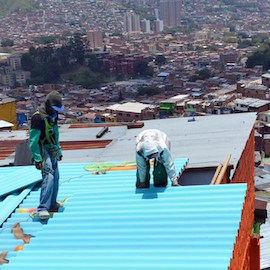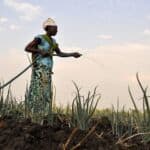The Winds of Change: Mobilizing Microfinance for Climate Change Resilience
Throughout the remarkable story of Homo sapiens, truly global challenges that had to be faced by an entire generation have been a rare occurrence. There have been global pandemics, plagues and world wars, but most of these have been rapid onslaughts or poorly understood events for which there could be no meaningful preparation. Climate change presents arguably the first time humanity is faced with a major global challenge that, due to advances in science, communications and education, we can both predict and attempt to prevent.
Slowly – excruciatingly so – action is being taken to rein in emissions in an attempt to keep global temperature below potentially catastrophic levels. But though we have arrived at a point where avoiding climate change in its entirety is no longer possible, much of the climate change debate still focuses on mitigation. In fact, adaptation – being resilient to the changes to come – will be an equally crucial component of surviving (and thriving) in a changing world. Moreover, while much of the mitigation response is at the macro level – the purview of (supra)national policy and industry – a great deal of this adaptation will have to be carried out at the community or even household level.
Nowhere is that more critical than among the low-income and financially excluded populations that comprise the clientele of microfinance providers around the world. Not only do they disproportionately earn livelihoods from activities most affected by climate change (such as agriculture, forestry and fisheries), but their countries and regions will be the most affected by flooding, drought, extreme storms, erosion and pestilence. This direct vulnerability is often exacerbated by the low economic and institutional capacities of the most affected countries, which limit their ability to cope with current weather-related events – not to mention the even more formidable challenges that climate change is bringing. And all these adverse effects are further multiplied by the growing risk of climate migration, displacing people to urban areas and across borders as refugees.
These issues are not limited to how the weather is changing. Climate change, its impacts and the responses to it, are inextricably linked to human rights and sustainable development, which balances social wellbeing, economic prosperity and environmental protection. Indeed, tackling the challenges posed by climate change is also one of the cornerstones of the Sustainable Development Goals (SDGs). It’s the focus of SDG13, which explicitly mandates “urgent action to address climate change and its impacts,” including strengthening resilience and adaptive capacity to climate-related hazards, and improving education and human and institutional capacity.
Although the challenge is daunting, there are abundant reasons to be positive. Within the agricultural, livestock, forestry and fisheries sectors, there is a broad range of emerging solutions, matched to the needs of vulnerable, low-income and financially excluded groups. What these solutions share is a focus on strengthening resilience. Resilient households adopt risk-reducing measures that help mitigate the catastrophic consequences of economic shocks. They demonstrate preparedness for future shocks, and they are able to manage these shocks without resorting to costly coping strategies, such as taking on unsustainable levels of debt, or selling productive assets.
But resilience to climate change goes beyond managing shocks. It also entails adapting to permanently changed environments, for example a reduction in rainwater, a shift in the seasons or higher temperature extremes. In both cases, access to financial and associated non-financial services can help households to adapt.
Providing these services will require a fundamental shift in the financial inclusion movement. This is the gauntlet thrown down by the €100,000 European Microfinance Award 2019, which launched on March 13th.
The role of financial inclusion in strengthening resilience to climate change
Entitled “Strengthening Resilience to Climate Change,” the Award highlights the financial inclusion sector’s important role in increasing the resilience of vulnerable communities to the effects of climate change. This role can include providing loans for investments in irrigation, drought resistant seeds or other adaptive solutions; writing insurance policies to support greater resilience to shocks; using remittance and transfer services to funnel aid in the aftermath of climate-related natural disasters; or facilitating clients’ long-term financial planning, including via savings products, to help them build more adaptable economic activities. Whatever the product or service, the financial inclusion sector has a hugely important role to play on the adaptation side of the climate change ledger.
Moreover, because institutions in this sector are embedded in the communities they serve, they too are often vulnerable to the effects of climate change. To build resilience among their clients, these institutions must also become resilient themselves. That means adapting to the changing economic situations of their clients (including their debt-repayment capacity), as well as building systems that allow for rapid and effective responses following weather disasters, such as floods or hurricanes. It may also mean integrating climate monitoring and forecasting technologies into both their strategic and operational decision making.
Finally, financial services aimed at increasing resilience may be complemented by non-financial products and services that fill capacity gaps. This can involve: awareness-raising and understanding of climate risks through technical assistance and training; promoting construction standards that increase resilience to flooding and high winds; and incorporating climate risk assessments and forecasts of extreme weather into institutional planning – then helping clients use the data in their economic activities.
About the European Microfinance Award 2019: ‘Strengthening Resilience to Climate Change’
Over its nine previous editions, the Award has sought to recognize institutions working in emerging areas of microfinance practice, such as projects addressing environmental needs, post-disaster or post-conflict areas, access to education and housing, and other challenges. First held in 2006, it includes a prize of €100,000 which will be awarded to the winner on Nov. 21 during European Microfinance Week.
To be eligible for this year’s Award, applicants must be organizations active in the financial inclusion sector that play an integral role in the provision of financial (and, where relevant, also non-financial) products and services focused on strengthening climate change resilience within low-income, vulnerable and excluded groups. While many applicants will directly provide financial products and services, those that do not directly provide them must play an essential, ongoing operational role in the project to be eligible. As always, eligible institutions must be based and operate in a least developed country, low income country, lower middle income country or an upper middle income country as defined by the Development Assistance Committee for ODA Recipients. Relevant products and services must be fully operational for at least one year, and eligible institutions must be able to provide audited financial statements.
This year, and in response to feedback to a survey conducted by the European Microfinance Platform (e-MFP) last year, the selection process has changed a bit. There will be two application rounds: The first, which was launched on March 13 and closes on April 9, 2019, involves only a short application form and the provision of audited financial statements, and will determine eligibility, innovation and relevance. Successful applicants will be invited in early May to submit a more extensive application form by late May. Both rounds will be evaluated by a preselection committee, before going to a larger selection committee of financial inclusion and climate change experts who will choose 7-10 semi-finalists and three finalists. A high jury will choose the winner, and the €100,000 prize will be presented on November 21, 2019 at a ceremony at the European Investment Bank headquarters during European Microfinance Week in Luxembourg. The application timeline, details of eligibility and more about the scope of the award can be found in the explanatory note that is published on the Award website in English, French and Spanish.
We at e-MFP, as well as the Award co-organisers Inclusive Finance Network Luxembourg and the Luxembourg Ministry of Foreign and European Affairs, are excited to hear from a broad array of organizations with an equally diverse range of initiatives that take different and innovative approaches to this great challenge of our time.
Daniel Rozas is a senior microfinance expert and Sam Mendelson is a financial inclusion specialist at the European Microfinance Platform.
Image credit: ©IFAD/Amadou Keita.
- Categories
- Environment, Finance



